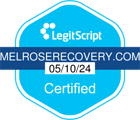Timeline for Alcohol Withdrawal
Explore the timeline and stages of alcohol withdrawal, and learn how the specialized detox program at Melrose Recovery provides the support you need. The journey to sobriety can be safe and effective with the right care and understanding. Let’s dive in and take those first steps together!
What are the Stages of Alcohol Withdrawal?
The initial stage of alcohol withdrawal typically begins 6–12 hours after the last drink. During this period, individuals may experience symptoms like:
- Anxiety
- Insomnia
- Nausea
- Loss of appetite
- Headache
- Sweating
- Mild tremors
- Heart palpitations
A thorough assessment is conducted to develop a personalized detox plan. Medications to alleviate nausea and anxiety are provided, and patients are constantly monitored to ensure their safety.
The acute withdrawal stage follows, occurring 12-48 hours after the last drink. This stage is marked by symptoms, including:
- Increased blood pressure
- Elevated body temperature
- Rapid breathing
- Irregular heart rate
- Confusion
- Sweating
- Irritability
- Moderate tremors
- Agitation
In some cases, hallucinations may also occur. Closely monitoring the vital signs and administering medications to stabilize heart rate and blood pressure from a medical team is essential. Therapeutic interventions are introduced to manage psychological symptoms.
The peak stage of alcohol withdrawal occurs 48–72 hours after the last drink. This period is characterized by severe symptoms, including:
- Hallucinations (visual, auditory, or tactile)
- Seizures
- Severe confusion and disorientation (delirium tremens)
- High fever
- Severe agitation
- Profound sweating
- Rapid heart rate
- Severe tremors
- Blood pressure spikes
During this critical period, around-the-clock medical supervision is ensured. Advanced medical treatments, including intravenous therapy and anticonvulsant medications, are employed to manage severe symptoms and prevent complications.
The post-acute withdrawal stage occurs 3–7 days after the last drink. During this stage, physical symptoms gradually reduce, although psychological symptoms may persist, such as:
- Anxiety
- Depression
- Sleep disturbances
Melrose Recovery in Los Angeles, CA provides continued support through counseling and therapeutic activities, encouraging patients to participate in group therapy and individual counseling sessions to address underlying psychological issues .
Your Transformation Start Here
How Does Melrose’s Detox Program Support Alcohol Withdrawal?
This initial phase is crucial for safely managing withdrawal symptoms under medical supervision. Doctors and nurses provide around-the-clock care, ensuring that the detox process is as comfortable and safe as possible, monitoring vital signs, and administering necessary medications to mitigate withdrawal effects.
MAT is used to support long-term recovery by using medications. These medications help reduce the physical and psychological cravings for alcohol, allowing individuals to focus on their therapy and recovery without the distraction of intense cravings.
- Benzodiazepines: Manage acute alcohol withdrawal symptoms like anxiety, seizures, and delirium tremens (DTs), stabilizing the central nervous system.
- Anticonvulsants: Prevent seizures, a common withdrawal symptom.
- Adrenergic Medications: Manage high blood pressure and rapid heart rate during withdrawal.
- Vitamins and Nutritional supplements: Address nutritional deficiencies and prevent complications like Wernicke-Korsakoff syndrome.
These therapeutic approaches are essential for addressing the underlying psychological aspects of addiction.
- CBT helps individuals identify and alter negative thought patterns and behaviors.
- DBT focuses on emotional regulation and developing interpersonal skills.
- Group therapy provides peer support and shared experiences, fostering a sense of community and accountability.
These complementary therapies aim to treat the whole person, not just the addiction.
- Nutrition therapy helps repair the body from the damage caused by alcohol use
- Experiential therapy engages patients in activities that promote self-discovery and healing, Adventure therapy involves outdoor activities that build self-esteem, resilience, and a sense of accomplishment.

How Melrose Ensures a Safe and Comfortable Detoxification Process
Our residential treatment provides around-the-clock medical supervision during this critical period. The medical team is available 24/7 to manage your symptoms using the latest practices, ensuring you feel safe and comfortable. Additionally, the counselors and therapists offer personalized therapy sessions to support your mental and emotional well-being throughout detox.
From the moment you walk through our doors, our compassionate staff is here for you, answering your questions, addressing your concerns, and cheering you on every step. We’re committed to helping you build a strong foundation for your recovery journey, so you can move forward with confidence and hope. Whether you’re starting your path to sobriety or continuing your recovery, Melrose is here to support you with care and compassion.
Long-Term Benefits of Undergoing Alcohol Withdrawal Treatment at Melrose
Alcohol withdrawal treatment helps cleanse the body of toxins, leading to better overall physical health, reduced risk of alcohol-related diseases, and improved liver function.
Professional treatment can address co-occurring mental health disorders, leading to improved mood, reduced anxiety, and decreased depression.
Structured programs and support systems increase the likelihood of maintaining long-term sobriety by providing tools and strategies to avoid relapse.
Achieving sobriety can lead to improved relationships, better job performance, and a higher quality of life overall.
Treatment centers often provide ongoing support through alumni programs and support groups, which can be crucial for maintaining long-term recovery.
Patients learn essential life skills and coping mechanisms to handle stress and triggers without resorting to alcohol.
The process of recovery often leads to significant personal growth, increased self-awareness, and a stronger sense of purpose.

Getting Help for Alcohol Withdrawal
Taking the First Step Toward Addiction Recovery
At Melrose Recovery, our addiction specialists strive for the highest quality of care and are here to change lives for the better









